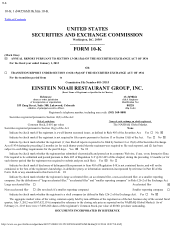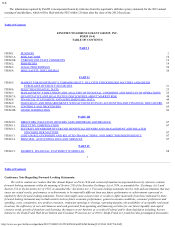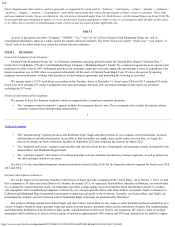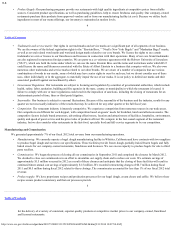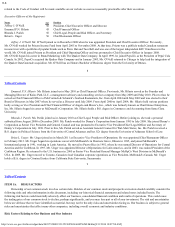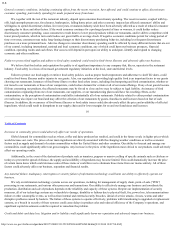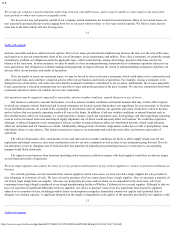Einstein Bros 2012 Annual Report Download - page 11
Download and view the complete annual report
Please find page 11 of the 2012 Einstein Bros annual report below. You can navigate through the pages in the report by either clicking on the pages listed below, or by using the keyword search tool below to find specific information within the annual report.
10-K
http://www.sec.gov/Archives/edgar/data/949373/000119312513085036/d445565d10k.htm[9/11/2014 10:07:50 AM]
We occupy our company-owned restaurants under long-term non-cancelable leases, and we may be unable to renew leases at the end of their
lease periods or obtain new leases on acceptable terms.
We do not own any real property, and all of our company-owned restaurants are located in leased premises. Many of our current leases are
non-cancelable and typically have terms ranging from five to ten years with two three- to five-year renewal options. We believe leases that we
enter into in the future likely will also be long-term
12
Table of Contents
and non-cancelable and have similar renewal options. Most of our leases provide that the landlord may increase the rent over the term of the lease,
and require us to pay our proportionate share of the cost of insurance, taxes, maintenance and utilities. If we close a restaurant, we generally remain
committed to perform our obligations under the applicable lease, which would include, among other things, payment of the base rent for the
balance of the lease term. In some instances, we may be unable to close an underperforming restaurant due to continuous operation clauses in our
lease agreements. Our obligation to continue making rental payments in respect of leases for closed or underperforming restaurants could have an
adverse effect on our business and results of operations.
If we are unable to renew our restaurant leases, we may be forced to close or relocate a restaurant, which could subject us to construction and
other costs and risks, and could have a material adverse effect on our business and results of operations. For example, closing a restaurant, even
during the time of relocation, will reduce the sales that the restaurant would have contributed to our revenues. Additionally, the revenue and profit,
if any, generated at a relocated restaurant may not equal the revenue and profit generated at the prior location. We also face competition from both
restaurants and other retailers for suitable sites for new restaurants.
Our operations may be negatively impacted by seasonality, adverse weather conditions, natural disasters or acts of terror.
Our business is subject to seasonal fluctuations, as well as adverse weather conditions and natural disasters that may at times affect regions
in which our company-owned, franchised and licensed restaurants are located, regions that produce raw ingredients for our restaurants, or locations
of our distribution network. As a result of the seasonality of our business and our industry, our quarterly and yearly results have varied in the past,
and we believe that our quarterly operating results will vary in the future. In addition, if adverse weather conditions or natural disasters such as
fires and hurricanes affect our restaurants, we could experience closures, repair and restoration costs, food spoilage, and other significant reopening
costs as well as increased food costs and delayed supply shipments, any of which would adversely affect our business. We could also experience
shortages or delayed shipments at our restaurants if adverse weather or natural disasters affect our distribution network, which could adversely
affect our restaurants and our business as a whole. Additionally, during periods of extreme temperatures (either hot or cold) or precipitation, many
individuals choose to stay indoors. This impacts transaction counts in our restaurants and could adversely affect our business and results of
operations.
The effects of hurricanes, fires, snowstorms, freezes and other adverse weather conditions are likely to affect supply of and costs for raw
ingredients and natural resources, near-term construction costs for our new restaurants as well as sales in our restaurants going forward. If we do
not anticipate or react to changing costs of food and other raw materials by adjusting our purchasing practices or menu prices, our operating
margins would likely deteriorate.
The impact on our business from terrorism (including cyber-terrorism or efforts to tamper with food supplies) could have an adverse impact
on our brand and results of operations.
We have single suppliers and vendors for many of our key products and the failure of any of these suppliers or vendors to perform could harm our
business.
We currently purchase our raw materials from various suppliers; and in some cases, we have selected a single supplier for a key product to
take advantage of economies of scale. We have elected to purchase all of our cream cheese from a single supplier. Also, we purchase a majority of
our frozen bagel dough from one supplier, who uses our proprietary processes and on whom we are dependent in the short-term. All of our
remaining frozen bagel dough is produced at our dough manufacturing facility in Whittier, California or by a second supplier. Although to date we
have not experienced significant difficulties with our suppliers, our choice to purchase most of our key ingredients from respective suppliers
subjects us to a number of risks, including possible delays or interruption in supplies, diminished control over quality and a potential lack of
adequate raw material capacity. A significant disruption in the supply or degradation in the quality of the materials provided by our suppliers could
13
Table of Contents

